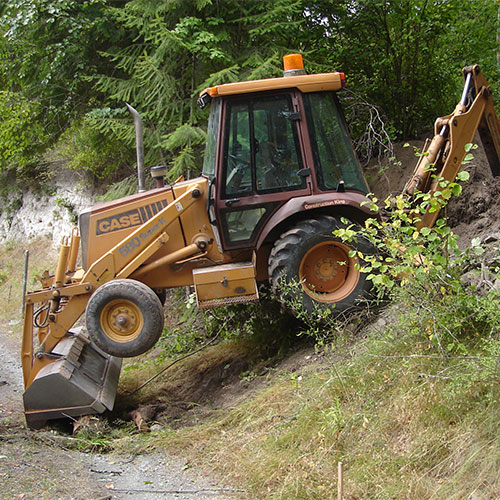Budget-friendly Lancaster Excavation - Quality Excavation at Competitive Rates
Budget-friendly Lancaster Excavation - Quality Excavation at Competitive Rates
Blog Article
Comprehensive Excavation Techniques: Grasping the Basics for Success
In the world of building and civil engineering, the significance of efficient excavation approaches can not be overemphasized. The careful preparation, exact execution, and thorough focus to detail required in excavation tasks require an extensive technique that incorporates numerous fundamental elements. From initial soil analysis to the application of safety and security procedures and routine progress tracking, grasping these core aspects is necessary for achieving success in any kind of excavation venture. Nonetheless, the true proficiency exists not simply in understanding these principles however in perfectly incorporating them to navigate the intricacies of excavation projects with finesse.
Recognizing Excavation Project Preparation

The initial phase of any kind of excavation project is the planning stage, where essential decisions are made that can substantially impact the outcome of the job. Recognizing the task spending plan, extent, and timeline restraints is crucial for developing a detailed excavation strategy that makes certain the job's success.
One trick aspect of excavation task planning is the growth of a thorough timeline that details the series of target dates, milestones, and tasks. By thoroughly thinking about all these factors during the preparation stage, excavation tasks can be performed efficiently and effectively, leading to successful results - septic ohio.
Soil Evaluation and Website Assessment
Performing comprehensive soil evaluation and website evaluation is an essential action in the preparation phase of any excavation job. Dirt evaluation includes figuring out the make-up, framework, and buildings of the soil at the excavation website. This info is vital for understanding the soil's bearing capacity, moisture material, and possibility for disintegration, which are vital consider establishing the excavation approaches and devices needed for the job.
Website assessment surpasses soil analysis and includes a wider evaluation of the total website problems. This assessment includes recognizing any kind of prospective dangers, such as underground utilities, ecological concerns, or unpredictable surface, that could influence the excavation procedure. By extensively reviewing the website, task managers can create reliable excavation approaches that focus on safety, performance, and environmental security.
Utilizing innovative technologies like ground-penetrating radar, dirt sampling, and drone surveys can improve the accuracy and performance of dirt evaluation and site examination. Investing time and resources in these initial steps can eventually conserve time and avoid costly hold-ups or difficulties throughout the excavation process.
Tools Choice and Usage
Effective excavation tasks rely greatly on calculated equipment choice and utilization to make sure optimum performance and productivity. Selecting the right tools for the task is important in maximizing performance and reducing downtime. Factors such as the kind of dirt, deepness of excavation, and project extent play a substantial function in identifying the most ideal equipment for the job at hand.

In enhancement to picking the appropriate devices, proper utilization is essential to task success. Operators has to be trained to deal with the devices securely and effectively - septic ohio. Regular upkeep checks and prompt fixings help avoid break downs and guarantee consistent performance throughout the task
Precaution and Rules Compliance
In the realm of excavation jobs, prioritizing safety and security procedures and compliance with laws is paramount to guaranteeing a protected and lawfully audio functional environment. Safety measures encompass a series of practices, including carrying out comprehensive site evaluations, applying correct signs and barriers, and offering appropriate safety and security training for all personnel involved in the excavation procedure. Adherence to regulations, such as OSHA demands in the United States, guarantees that the excavation job meets the essential standards to protect employees, onlookers, and the surrounding atmosphere.

Monitoring Progress and Adjusting Approaches
How can predict managers properly track the advancement of excavation projects and adapt their methods accordingly to maximize results? Monitoring development is crucial for making sure that excavation jobs stay on track and fulfill due dates. Task managers can utilize different tools and strategies to track progression, such as daily progress records, routine website assessments, and progressed surveillance modern technologies like drones and general practitioners tracking systems. By continuously monitoring the task's development, supervisors can determine any kind of possible hold-ups or issues early and take positive actions to address them.

Final Thought
To conclude, understanding the basics of comprehensive excavation approaches is important for the success of any task. By comprehending job click here to read planning, assessing soil and site problems, choosing appropriate tools, adhering to security regulations, and keeping an eye Homepage on progression, project supervisors can ensure a effective and smooth excavation process. Carrying out these approaches will certainly cause effective results and decrease prospective dangers or obstacles throughout the excavation project.
The first stage of any kind of excavation task is the preparation stage, where vital decisions are made that can dramatically impact the end result of the job. Recognizing the project budget, extent, and timeline restraints is vital for developing a detailed excavation plan that makes certain the project's success.
How can forecast managers successfully track the improvement of excavation projects and adapt their approaches accordingly to enhance end results? By closely checking progression and being prepared to adapt techniques, project managers can boost the total success of website link excavation projects.
By understanding project preparation, examining soil and site problems, choosing suitable devices, complying with safety and security laws, and checking development, project supervisors can make certain a smooth and efficient excavation process.
Report this page